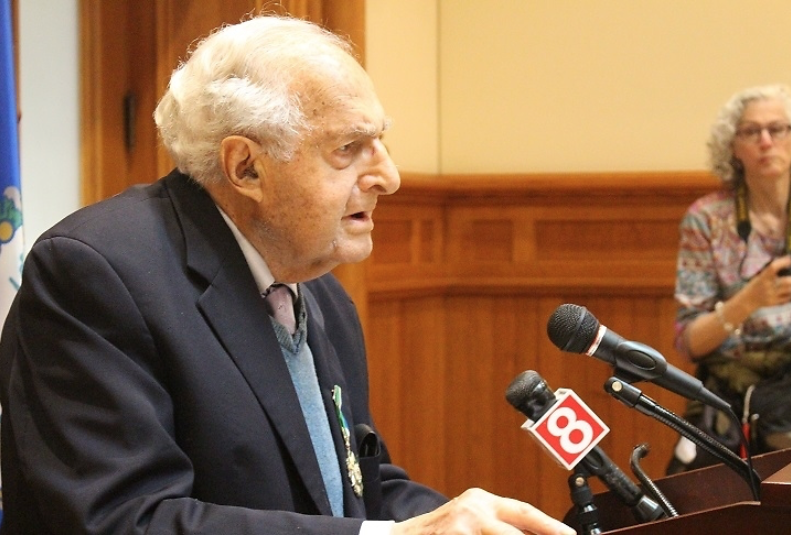
Thomas Breen Photo
Al Marder, in his capacity as Amistad Committee President, welcoming the president of Sierra Leone to New Haven City Hall in 2019.
Al Marder, who spent most of a century organizing local and international peace efforts from his home base of New Haven, died on Tuesday.
He died one month shy of his 102nd birthday and less than a day after being admitted to Connecticut Hospice in Branford.
“He was active and sharp and expressing his opinions and ideas until the very end,” said close friend and mentee Henry Lowendorf. “He was not shy.”
Well into his last decade, Marder was an indefatigable, hands-on people- and government-mover. He played a leading role in efforts to create the Connecticut Freedom Trail, New Haven’s Peace Commission, and the Amistad and William Lanson memorial statues here in town. He played a leading role in national and state organizations such as the U.S. Peace Council, the World Peace Council, and the International Association of Peace Messengers.
With a mix of determination and respectful good cheer, Marder pressed his views with all he encountered and encouraged other activists to follow his lead.
Peace activist Millie Grenough recalled meeting Marder during the Iraq War in 1991. She told him about a CD of peace songs she had co-recorded with Jeff Fuller.
“He said, ‘You should get a grant from the Haymarket Fund to spread this around,’” Grenough recalled. “So I did. The Haymarket Fund gave us money so we could print copies of all the songs and distribute them to all the New Haven Public Schools and do a concert at the library. He was just there.”
Retired Probate Judge Clifton Graves Jr., who worked alongside Marder on initiatives for 35 years, recalled him as a “great leader, courageous, cantankerous, committed to racial and social justice; an atheist/Communist who fought harder to uphold the values and principles put forth in the Bible, Koran and Torah than most of those who swear by those religious books. His legacy of fighting for racial, social, and economic justice will outlive us all.”
Growing up the son of Ukrainian Jewish immigrants who struggled to keep the debt collector away from their small grocery store on New Haven’s since-bulldozed Oak Street, Alfred Leo Marder as a boy saw sheriffs clear out his parents’ receipts during the Great Depression. He saw young Communists pick up furniture deposited on the sidewalk and return to the homes of evicted tenants. At Hillhouse High School he met other Communists, became a leader of the party’s local youth wing at 15, and never looked back.
He remembered as a teen swiping his dad’s keys while his dad slept in the family’s cramped Davenport Avenue home, then rolling the car down the street with a fellow organizer. They didn’t want Marder’s dad to hear the car start before they set off on organizing rounds. Marder’s father didn’t favor the “Reds.”
Marder remained loyal to the Communist Party cause decades after former colleagues renounced the faith. He talked about that in a 2016 WNHH-FM interview, revisiting the turning points when so many on the left ditched “the god that failed” — the Soviet Union-directed Communist Party — wrenching apart friendships and families in the process. Marder remained steadfast in the faith amid reports of purges, show trials, the Hitler-Stalin Pact, Siberian exile and executions of political dissidents or ethnic minorities. Marder either dismissed those reports as fabricated propaganda or viewed them as errors committed in the context of a noble larger cause. He stuck with the cause after the Soviet Union fell in 1991, and the old Soviet bloc along with it.
Marder helped found the People’s Center on Howe Street after Communists broke off from the Jewish socialist Workmen’s Circle group in 1937 over the group’s opposition to developments in the Soviet Union. Marder used his political pull to keep it in business amid a funding-cut threat in 2012.
In 1954 he was one of seven New Haveners arrested under the Smith Act, which prohibited not necessarily advocating the overthrow of the government, but conspiring to advocate the government’s overthrow. Marder was the only one acquitted at trial, for reasons he said he still couldn’t fully understand decades later.
Click on the above podcast to listen to the full interview with Marder in 2016 about his lifelong activism. Click here to read an edited transcript. The family’s official obituary follows.
